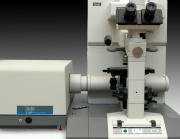Fourier transform infrared spectroscopy
Description
An analysis technique used to obtain an absorption or emission spectrum of vibrational changes in chemical bonds. A Fourier-transform infrared (FTIR) spectrometer simultaneously collects high-resolution spectral data over a wide spectral range, typically 4000-600 cm-1 (wavenumbers). The vibrational changes that occur in chemical functional groups are unique and reproducible. The combination of these interactions with the infrared beam, represented as a spectrum, produce a unique pattern for each class of material. When multiple materials are present the absorption patterns for each material are present in a additive pattern. This often allows the elucidation of many of the component in a simple mixture, Thus, infrared spectroscopy serves as a first step to more complete identification using other techniques. Most museum labs have their FTIR equipped with a microscope as well-as a reflective option. Thus small samples can be examined in transmitted or reflected light modes. A micro-attenuated total reflectance (ATR) attachment for the microscope is also available for studying the composition of thin coatings, such as the varnish on a painting or photograph.
IR spectrum of indigo
FTIR, sample Forbes 443(MFA)
Synonyms and Related Terms
FT-IR; FTIR; Fourier-transform infrared spectroscopy; Fourier-Transformation Infrarot Spektroskopie (Deut.); spectroscopie infrarouge par transformée de Fourier (Fr.);
Resources and Citations
- Wikipedia: Fourier-transform infrared spectroscopy (Accessed June 2023)
- National Gallery of Art Scientific Research: Spectroscopy
- M.Derrick, D.Stulik, J.Landry, Infrared Spectroscopy in Conservation Science, In Scientific Tools for Conservation series, Getty Conservation Institute, Los Angeles, 1999.
